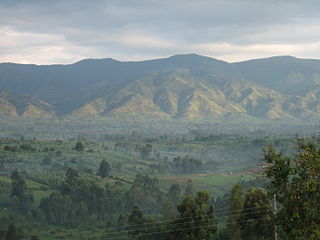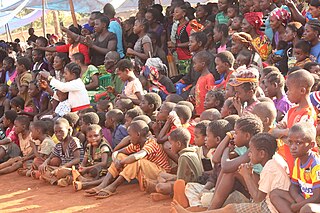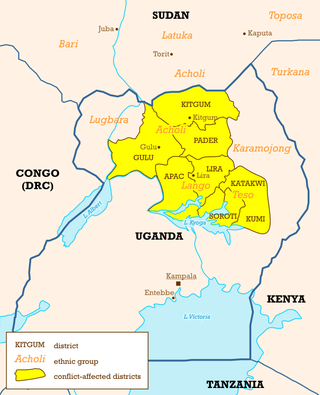Related Research Articles

North Kivu is a province bordering Lake Kivu in the eastern Democratic Republic of the Congo. The capital city is Goma. Spanning approximately 59,483 square kilometers with a population estimate of 8,147,400 as of 2020, it is bordered by Ituri Province to the north, Tshopo Province to the northwest, Maniema Province to the southwest, and South Kivu Province to the south, as well as Uganda and Rwanda to the east.

South Kivu is one of 26 provinces of the Democratic Republic of the Congo (DRC). Its capital is Bukavu.

The Burundian Civil War was a civil war in Burundi lasting from 1993 to 2005. The civil war was the result of longstanding ethnic divisions between the Hutu and the Tutsi ethnic groups. The conflict began following the first multi-party elections in the country since its independence from Belgium in 1962, and is seen as formally ending with the swearing-in of President Pierre Nkurunziza in August 2005. Children were widely used by both sides in the war. The estimated death toll stands at 300,000.
Banyamulenge is a community that lives mainly in South Kivu province. The Banyamulenge are culturally and socially distinct from the Tutsi of South Kivu, with most speaking Kinyamulenge, a mix of Kinyarwanda, Kirundi, Ha language, and Swahili. Banyamulenge their role in Mobutu's war against and victory over the Simba Rebellion, which was supported by the majority of other tribes in South Kivu, their role during the First Congo War and subsequent regional conflicts (Rally for Congolese Democracy–Goma, Movement for the Liberation of the Congo, National Congress for the Defence of the People, and more importantly for the fact that two of the most influential presidents of their country declared them as enemy of the State both in 1996 and 1998.
The village of Gatumba lies on the western side of Burundi, near the border with the Democratic Republic of the Congo. The place is known for a massacre that took place at Gatumba refugee camp connected to the village.

Azarias Ruberwa Manywa is a Congolese politician, lawyer, and public figure. During the Second Congo War he was Secretary-General of the Rassemblement Congolais pour la Démocratie (RCD-G) rebel group. Following the war, he was one of the vice-presidents in the transitional government of the Democratic Republic of the Congo between 2003-2006. He has also been the leader and president of RCD-G's political party since 2003. He is a member of the Banyamulenge community of South Kivu who belong to the Tutsi ethnic group.

The National Forces of Liberation is a political party and former rebel group in Burundi. An ethnic Hutu group, the party was previously known as the Party for the Liberation of the Hutu People and adhered to a radical Hutu Power ideology, but since the mid- to late-2000s has moderated its stance and cooperated with the Tutsi-supported Union for National Progress party in opposition to the rule of Pierre Nkurunziza and the CNDD-FDD.

The Kivu conflict is an umbrella term for a series of protracted armed conflicts in the North Kivu and South Kivu provinces in the eastern Democratic Republic of the Congo which have occurred since the end of the Second Congo War. Including neighboring Ituri province, there are more than 120 different armed groups active in the eastern Democratic Republic of Congo. Currently, some of the most active rebel groups include the Allied Democratic Forces, the Cooperative for the Development of the Congo, the March 23 Movement, and many local Mai Mai militias. In addition to rebel groups and the governmental FARDC troops, a number of national and international organizations have intervened militarily in the conflict, including the United Nations force known as MONUSCO, and an East African Community regional force.

Nyarugusu refugee camp is one of the largest and best-known refugee camps of the 21st century, with around 150,000 refugees.

Bunyakiri is a town located in the high plateau of Kalehe Territory in the South Kivu Province in the eastern region of the Democratic Republic of the Congo (DRC). Bunyakiri is nearby the Bulehe and Mulamba villages. It is mainly inhabited by Tembo, Havu, Twa and Hunde ethnic groups.

Uvira Territory is a territory located in South Kivu Province in the eastern region of the Democratic Republic of the Congo. Encompassing an area of roughly 3,146 kilometers and with a population estimate of 1,165,092 as of 2020, it is bordered by Walungu Territory to the north, Mwenga Territory to the west, and Fizi Territory to the south. The territory's southeastern boundary is defined by the city of Uvira, which attained city status on 13 June 2019, while the eastern perimeter adjoins the Republic of Burundi and Lake Tanganyika. Within the territory, Kiliba and Sange serve as significant towns.
Sandra Uwiringiyimana is an author and member of the Banyamulenge tribe. Sandra was born in South Kivu, located in the Democratic Republic of Congo, and spent the majority of her childhood in the Congolese city of Uvira. She is a survivor of the Second Congo War, and the 2004 massacre at the refugee camp in Gatumba, Burundi, by the National Liberation Front of Burundi. She spent a few years in Africa as a stateless refugee, before the U.N. offered her family a chance to relocate to America in late 2005. The application and screening process took years, but in April 2007 the family left Africa for Rochester New York.

Uganda is one of the largest refugee-hosting nations in the world, with 1,529,904 refugees. The vast influx of refugees is due to several factors in Uganda's neighboring countries, especially war and violence in South Sudan and the Democratic Republic of the Congo, and associated economic crisis and political instability in the region. Uganda has relatively 'friendly' policies that provide rights to the refugees, such as rights to education, work, private property, healthcare and other basic social services.

During the First Congo War, Rwandan, Congolese, and Burundian Hutu men, women, and children in villages and refugee camps were hunted down and became victims of mass killings in eastern Zaire.
Burungu is a settlement in the North Kivu province of the Democratic Republic of the Congo.

Kamanyola is one of the groupements (groupings) within the Ngweshe Chiefdom of the Walungu Territory. It is located in the Ruzizi Plain in the South Kivu Province of the Democratic Republic of the Congo (DRC), sharing a border with Rwanda and Burundi. Kamanyola stands at a height of 901 meters and is closely situated to the suburb of Mwaro and the village of Mubombo.
The Kasika massacre took place on August 24, 1998, in the villages of Kasika, Kilungutwe, Kalama, and Zokwe, located in the Luindi Chiefdom of the Mwenga Territory in the South Kivu Province, situated in the eastern part of the Democratic Republic of the Congo (DRC). Troops from the Rally for Congolese Democracy (RCD) and Rwandan Patriotic Army (RPA), primarily composed of Tutsi armed forces, killed over 1,000 civilians, predominantly belonging to the Nyindu community.
The Bafuliiru Chiefdom, also spelled as Chefferie de Bafulero, is a chiefdom located in Uvira Territory, South Kivu Province, in the eastern region of the Democratic Republic of the Congo.
Gihinga Refugee Camp is a refugee camp found in Burundi.
Cishemeye Transit Center was a temporary refugee camp in Burundi created by United Nations High Commissioner on Refugees to house refugees who were fleeing from the Kivu in Democratic Republic of Congo.
References
- 1 2 "Burundi: The Gatumba Massacre - War Crimes and Political Agendas (Human Rights Watch Briefing Paper,September 2004): Summary". www.hrw.org. Retrieved 2023-12-14.
- 1 2 Refugees, United Nations High Commissioner for. "Refworld | U.S. Committee for Refugees World Refugee Survey 2004 - Burundi". Refworld. Retrieved 2023-12-14.
- 1 2 3 4 Fernando, Del Mundo (2004-08-16). "Burundi to set up refugee camp for new Congolese arrivals following deadly attack". UNHCR. Retrieved 2023-12-14.
- 1 2 3 "Burundi: The Gatumba Massacre - War Crimes and Political Agendas (Human Rights Watch Briefing Paper,September 2004): Summary". www.hrw.org. Retrieved 2023-12-14.
- 1 2 Helene verney, Mary (2004-09-15). "Congolese refugees prepare to move to new camps in Burundi". UNHCR. Retrieved 2023-12-14.
- ↑ Millicent, Mutuli (2002-12-17). "Congolese refugees in Burundi transferred away from volatile border region". UNHCR. Retrieved 2023-12-14.
- 1 2 3 Didier, Bukuru. "Survivors mark anniversary of massacre at Burundi transit camp". UNHCR. Retrieved 2023-12-14.
- ↑ "Burundi: The Gatumba massacre - Burundi | ReliefWeb". reliefweb.int. 2004-09-07. Retrieved 2023-12-14.
- 1 2 "Tutsis massacred in Burundi camp". BBC NEWS. 2004-08-14. Retrieved 2023-12-14.
- ↑ Davey, Christopher P. (2022-10-02). "Burundi's Gatumba massacre offers a window into the past and future of the DRC conflict". The Conversation. Retrieved 2023-12-14.
- ↑ "Burundi: 15 Years On, No Justice for Gatumba Massacre | Human Rights Watch". 2019-08-13. Retrieved 2023-12-14.